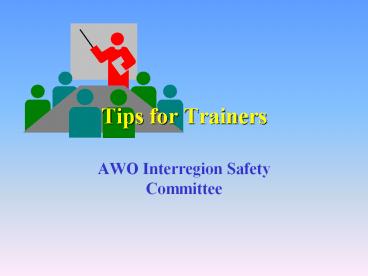Tips for Trainers - PowerPoint PPT Presentation
1 / 19
Title:
Tips for Trainers
Description:
Your 3 Worst Training Experiences - Why. The Best Trainer You ... Unconscious Competence 'In a Rut'- Most Dangerous. Be A Motivator. Be A Confidence Builder ... – PowerPoint PPT presentation
Number of Views:327
Avg rating:3.0/5.0
Title: Tips for Trainers
1
Tips for Trainers
- AWO Interregion Safety Committee
2
Group Exercise
- Take A Sheet of Paper and Briefly Write Down
- Your 3 Best Training Experiences - Why
- Your 3 Worst Training Experiences - Why
- The Best Trainer You Ever Had - Why
- The Worst Trainer You Ever Had - Why
3
Getting Ready to Learn to Learn
Maslows Hierarchy of Needs Applied to Training
4
Learning Stages
Be A Motivator
- Unconscious Incompetence
- Dumb and Dont Know It
Be A Confidence Builder
- Conscious Incompetence
- Realize How Much They Dont Know
Be A Coach and a Consultant
- Conscious Competence
- Good and They Know It
Get Them Involved
- Unconscious Competence
- In a Rut- Most Dangerous
5
Learning Progress
6
Different Ways We Learn
- Auditory Learners Learn by Hearing
- Recall Best What They Have Heard Lecture and
Feedback from Fellow Students
- Visual Learners Learn by Seeing
- Key Points Written Down, PowerPoint, Flip Charts
- Hands-On Learners Learn by Doing
- Role Playing, Group Exercises
7
A Mix of Learning Techniques
- The Most Effective Method
- Hear It - Lecture
- See it PowerPoint, Flip Charts
- Do It Role Playing, Group Exercises
8
--Till You Train Them--
Training Exercise
Your Trainees Know Nothing
- With Your Back to the Trainee, Ask Him/Her to Put
on the Life Jacket - Ask the Audience to Help
- Turn Around and Demonstrate
9
More Tips for Trainers
- Know Your Audience
- Know the Reason for the Training
- Know the Environment
- Develop Your Presentation
- Develop Your Introduction
- Critique Yourself
- Conclusion
- Follow Up
10
Become Body Aware
- Avoid
- Hands in Pockets
- Rattling Pocket Coins
- Repeating Expressions Such as You Know
- Leaning on the Podium
- Playing with Pens, Papers, Paper Clips, etc.
- Pacing
- Scratching
- Playing with Hair
- Rubbing Hands
- Twisting Rings or Jewelry
11
Exercise Lets Talk
Understanding Communication
- In Groups of Two, Talk to Your Partner About
Anything for Two Minutes - Tell Your Partner What You Noticed About His/Her
Nonverbal Behavior - Exchange Roles and Do the Same Thing
- Now Each Team Talk without Any Nonverbal
Movements
12
Discussion Questions
- Were You Aware of Your Nonverbal Movements in the
First Conversation? - Did You Find Any of Your Partners Movements
Distracting? - How Did It Feel When You Were Unable to Use Any
Nonverbal Communication? - Was Your Communication as Effective?
13
Listening
- Average Adult Only Remembers 25 Percent of What
He/She Hears - How to Improve
- Dont Jump to Conclusions
- Judge Content, Not Delivery
- Delay Evaluation
- Listen for Ideas
- Actively Work at Listening
- Resist Distractions
- Paraphrase
14
Why Trainers Ask Questions
- Get or Clarify Information
- Provide Interaction
- Individual Attention
- An Opportunity for the Trainee to Share View
Point
Rules for Questions
- Address to Individual or Group
- Make the Question Open Ended to Encourage
Discussion - Provide Positive Support
15
Responding to Questions
- Listen
- Be Objective
- Dont Interrupt
- Repeat
- Direct the Question Back to the Group
- Make Sure All Can Hear
- Involve the Group
- Respond
- Briefly and Truthfully
- Relate to Subject
- Its OK Not to Know
16
Presentation SkillsGroup Exercise
- In Groups
- Elect a Spokesman and a Scribe
- Spokesman Will Explain the Groups List
- Share Your List With the Whole Group
17
Using What You Have Learned
18
Summary
- Trainees Have Basic Needs That Must Be Met for
the Training to Be Effective - Overcoming Learning Obstacles
- Motivating, Coaching
- Learning Comes in Stages
- Unawareness to Passion
- Different Ways of Learning
- Hearing, Seeing, Doing
- Basic Tips
- Know Who, Why What, Where
- Self Awareness
19
Summary, Cont.
- Nonverbal Communication
- Use Gestures to Make Your Communications More
Effective - Listening
- Adults Remember Only 25 Percent of What They Hear
- Ask Questions
- Open Ended, Positive Reinforcement
- Respond to Questions
- Listen, Repeat, Respond
Enjoy Training!































